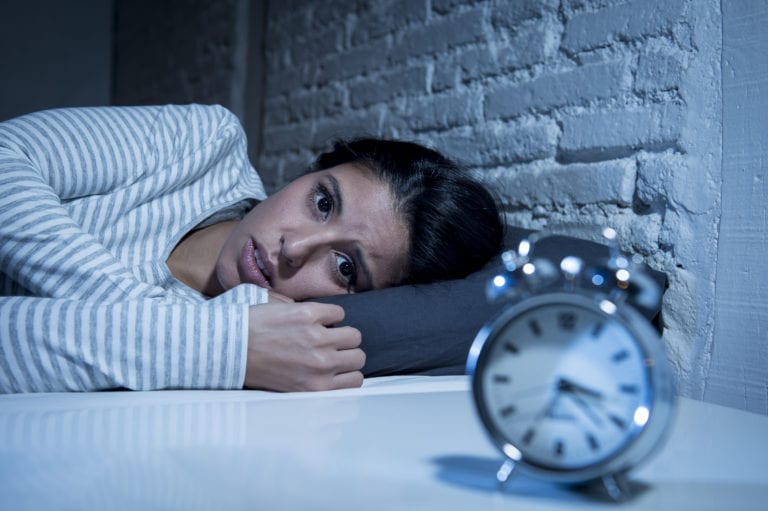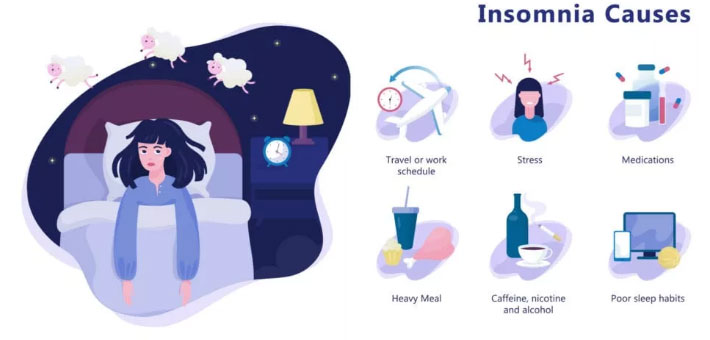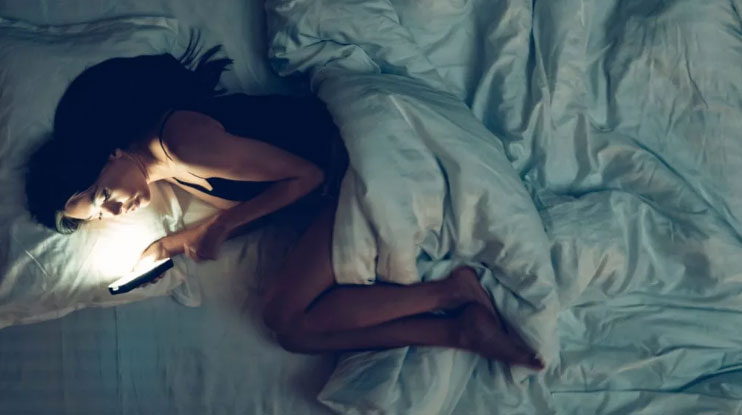
Can’t Sleep Because of Anxiety?
It’s a routine you know all too well. You’re getting ready for bed, tired, and ready to sleep. Then as soon as you crawl between your sheets about to step into dreamland, your anxiety starts tapping on the windows in your brain and you’re unable to do anything other than overthink everything your brain brings to the surface. Anxiety induced insomnia strikes again.
If you can’t sleep because of anxiety, we are here to help you understand the relationship anxiety can have on sleep and offer tips on how you can conquer your insomnia.
Relationship Between Anxiety and Insomnia
For those who struggle with anxiety, you may also have experience dealing with insomnia. In many cases, the two go hand in hand and insomnia is a symptom of anxiety. Anxiety symptoms can show up at any point in the day. However, symptoms that rear their ugly head at night often show up in the form of insomnia.
Forms of Anxiety
GAD
GAD (generalized anxiety disorder) is a form of anxiety that affects 3.1% of the U.S. population (approximately 6.8 million adults). People who struggle with GAD often find themselves with a consistent worry over a multitude of different issues like health, family, work, and money. This type of anxiety can also be very difficult for individuals to control, and can range from mild to severe cases.
OCD
OCD (obsessive compulsive disorder) is a form of anxiety that has no discrimination. It can affect any person no matter the age or life situation. OCD presents itself as a cycle of unwanted or intrusive thoughts and feelings and in an attempt to alleviate those thoughts and feelings and people engage in compulsive behavior. Those struggling with OCD are often misunderstood, and cases can range anywhere from mild to severe.
PTSD
PTSD (post traumatic stress disorder) is a form of anxiety that is a result of experiencing or witnessing any sort of trauma. Symptoms typically show up as nightmares, flashbacks, panic attacks, and an inability to control thoughts about the event that took place. Most of the time, symptoms affect the ability to do day-to-day activities like work or sleep. Those struggling with PTSD may also see a change in their physical and emotional responses to situations or experiences that used to not bother them.
Panic Disorder
Panic disorder is often diagnosed when a person struggles with seemingly “random” or “non-triggered” panic attacks. On average, around 2-3% of people in the U.S. have experience with panic disorder each year and it is typically found to be more common in women. Panic disorder can trigger panic attacks even in the midst of sleeping, causing a person to wake up, and leading to continuous insomnia.
Social Phobia
Social Phobia (also known as social anxiety disorder) is often characterized by someone who struggles with an extreme fear of social situations that could lead them to be judged, evaluated negatively, or rejected. Many who deal with this form of anxiety often find themselves avoiding these interactions at all costs. This is the second most common form of anxiety and has been reported to affect over 15 million adults in the U.S.
Forms of Insomnia
Acute
Acute Insomnia is the most common form of insomnia. Almost every person will experience this type of insomnia at some point in their lives. This type typically happens when a person is going through a stressful time, such as moving or dealing with a bad argument with a loved one. Although Acute insomnia is also known to be caused by other factors like:
- Side effects of a medication
- Being in physical pain or discomfort
- Light or noise disruptions that are close to or in your sleeping space
- Sleeping in a new or unfamiliar space
- Suffering from an ailment
Chronic
Insomnia that is classified as chronic happens when a person experiences trouble sleeping for at minimum three days out of the week within a one-month timeframe. Chronic insomnia can either come as a direct result of a medical condition, or be random on the surface with no apparent reasons as to why. A few common causes of chronic insomnia include, but aren’t limited to:
- Sleep apnea, Parkinson’s disease, diabetes, or other diagnosable issues.
- Depression or anxiety
- Medications
- Caffeine or overstimulation
- Frequent napping
- Unstable sleep schedule (like professionals who work night shifts)
Comorbid
Comorbid is a type of insomnia that appears to worsen the side effects of other mental or medical issues. Insomnia is hard enough to battle, but when it appears in this form, it can make life more difficult because of the heightened clinical outcomes of the other mental, medical or sleep-related illnesses.
Onset
Onset insomnia happens when someone struggles with initiating sleep. This type of insomnia is commonly chronic or short term. There are many reasons people may struggle with onset insomnia, but the most common causes are related to psychological issues like stress, anxiety, or depression. This sleep disorder is often paired with another sleep disorder like a restless leg syndrome. However, onset insomnia could be caused by something as simple as excessive caffeine.
Maintenance
Those who struggle with maintenance insomnia often have difficulty staying asleep, waking up too early, and have issues with falling back to sleep. Maintenance insomnia is often paired with the anxiety that you cannot get enough sleep or will be incapable of falling back asleep, which makes the problem worse.
Maintenance insomnia, like other forms of insomnia, can stem from a variety of things like:
- Depression or anxiety
- Sleep apnea
- Restless leg syndrome (RTS)
- Periodic limb movement disorder
How Anxiety At Night Can Affect Sleep
Anxiety disorders look much different on different people. Some anxiety flares up with specific triggers, while other anxiety symptoms are more consistent and get in the way of living a healthy, day-to-day routine. Anxiety tricks the brain into believing that it is in danger, which sets off adrenaline in the body, resulting in many physical side effects like an increased heart rate or shortness of breath. Most commonly, though, anxiety can lead to sleep issues like insomnia.
Many find themselves struggling with anxiety worse during the nighttime versus the daytime. A variety of different factors could cause this. One, for example, is that individuals have less distractions at night to keep their mind off their worries, which can lead to symptoms of anxiety and insomnia.
A common phenomenon that many do not realize is caused by anxiety is the fear of not being able to fall asleep. Yes, that is considered anxiety. You’re lying wide awake in bed, stressed about how every half hour that goes by is one less half-hour of sleep you will get before work, a big meeting, or significant life event.
It’s important to remember that sleep is an essential function for your body. As expert Thomas McDonagh, Psy.D, anxiety expert, and founder Good Therapy SF put it, “Sleep is very routine based. So if something causes poor sleep over a period of time (such as a work deadline) these poor sleep habits can become routine, and eventually the anxiety becomes about an inability to fall asleep and not the original stimulus.” With that said, it’s not easy to break an existing sleep-anxiety cycle: “Anxiety causes our bodies to be in a state of arousal or alertness, which obviously makes it difficult to enter a sleep state where we feel calm and relaxed,” Dr. McDonagh notes,”The change from a fight or flight to rest and digest nervous system does not happen quickly.”
For those experiencing anxiety, it’s important to keep in mind how this cycle may impact your sleep experience in general over time, not just one individual night.
The Sunday Scaries
The “Sunday Scaries” is a term that has risen in mainstream conversation about anxiety over the last few years. This refers to the type of anxiety many people face on Sunday night before they have to return to their job or school – despite how satisfied they are with their circumstances. Many believe this is due to the limited time the weekends hold for people to accomplish tasks they are unable to address during the workweek.
Due to this, Sunday becomes one of the only days of rest for many people, which can lead to anxiety about returning to the hustle and bustle of their day jobs. LinkedIn did a study in 2018 that revealed that 80% of Americans worry about the workweek ahead on Sunday evening.
Shutting Down the Sunday Scaries
We asked Dr. Patricia Celan, Psychiatry Resident at Dalhousie University in Canada her take on the Sunday Scaries: “The Sunday Scaries come from being anxious about the coming week. Manage that by making plans to be too busy having fun on Sunday so you can keep your mind off it, and then unwind at bedtime with a calming meditation and the other science-proven ways to calm down before bed,” she recommends.
For those of us who may have anxiety about work left undone during the week, Dr. Celan notes, “If you tend to feel overwhelmed on Sundays because of incomplete tasks before the week begins, make it a priority to do your chores and other necessities on Friday, so you can fully enjoy your weekend.”
Anxiety and Insomnia During COVID-19
Many find that anxiety and insomnia have increased during this year’s pandemic brought on by the coronavirus (COVID-19). Charles Morin claims in his research that, “While the emergence of sleep disturbances and psychological distress in response to stressful life events is to be expected, the prolonged measures of social confinement and isolation during COVID-19 brings new dimensions to this crisis that might explain the increased incidence of sleep problems.”
It also goes without saying that insomnia brought on by anxiety can lead to other mental health side effects. A lack of sleep can often lead to delusions, irritability, depression, and you guessed it – more anxiety.
Myth vs. Fact in Curing Anxiety Insomnia
It can be tempting to seek a quick fix when it comes to reclaiming your sleep while you’re struggling with anxiety-related insomnia. However, many fast-acting “remedies” may do more harm than good in the long run.
For example, taking melatonin before bed may be an excellent way to help with acute insomnia; however, it is not a long term solution. If taken too frequently, your body can begin to develop a tolerance for the supplement and impair your body from naturally producing it on its own.
Other home remedies like alcohol consumption and taking an over-the-counter medication like Benadryl are also potentially dangerous paths to take. Both of these are considered depressants for the body and can negatively affect your central nervous system, or worsen anxiety and insomnia symptoms.
Treating Insomnia
People who find themselves struggling with anxiety and insomnia should speak with their doctors to find the best treatment option.

People experience anxiety and insomnia for different reasons, so different methods may be needed for each individual. Many doctors recommend several over-the-counter or prescription sleep aids and anxiety medications that may be able to help. Although there is a newer form of treatment, many doctors have been gravitating to called cognitive behavioral therapy for insomnia (CBT-I).
CBT-I
Institutions like Healthline have claimed that CBT-I is just as, if not more effective in relieving anxiety-related insomnia than traditional medications. CBT-I acts as a type of therapy that helps you address anxiety you feel and understand your sleep habits.
Those struggling with more severe anxiety and are grappling with suicidal thoughts, or believe their loved ones are in trouble should immediately reach out for help. The National Suicide Prevention Lifeline is available 24 hours a day at 1-800-273-8255.
Tips For Managing Anxiety Before Bed
There are many ways that people can alleviate some of their struggles with sleep that do not require medication or a specialist.
If you’re experiencing anxiety before bed, we recommend intentionally reminding yourself about what you’re experiencing. “Anxiety is an increase of the hormone adrenaline in the bloodstream because the body or mind perceives danger,” says family therapist Jodi Aman. “If you were actually in danger, your body would not want to be asleep so this adrenaline keeps you awake. Thus, anxiety at bedtime is a recipe for trouble.”
She recommends a variety of strategies for a clear mind at night, like creating a calming nighttime ritual that includes self-massage, a warm bath, or listening to meditative music. We’ve included additional stress-relieving tips below.

While all these tips may not be effective for more severe types of anxiety and insomnia, they certainly do not hurt to try.
- Self-Care – Indulgences like therapy, yoga, and meditation have been found to be highly effective in rejuvenating the body and soul. Many who participate in these practices frequently are often more relaxed and connected to their mind and body.
- Reading a Book – Reading has been a long time cure for stress relief for many. People who take up a book to read often are able to give their brains a break from their thoughts and relax before bed.
- The 20 Minute Rule – If you find it hard to fall asleep after 20 minutes, get up, and practice a relaxing activity in a minimal stimulating room. This will separate your body and mind’s frustrated feelings of restlessness from your bed.
- Aromatherapy – Aromatherapy is a form of relaxation that many swear by. Investing in oils that are known to have relaxing effects on the body like lavender, frankincense, and sandalwood could benefit your bedtime routine. Simply start diffusing about one hour before bed and let the juices work their magic.
- Limiting Screen Time – In these modern times, it is nearly impossible to escape screens. However, limiting screen time or removing it entirely one hour before bed has been shown to help reduce sleep issues. By giving your eyes a break from the blue light that omits from electronics, your body has a chance to relax and slow down before bed.
- Enjoying a Cup of Tea – Herbal tea, that is. Similarly to aromatherapy, herbal teas like Chamomile contain many relaxing properties from plants that can help your body be ready to dive into dreamland when the time is right.
https://www.myslumberyard.com/blog/how-does-anxiety-affect-sleep/
The AgilityRx Card is easy to use Simply present the AgilityRx Discount Card along with your health insurance card and ask your pharmacist to process your prescription with the plan that provides you with the lowest cost.